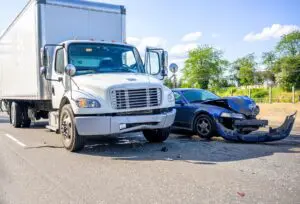How Long Could My Truck Accident Case Take to Settle?
Does It Take a Long Time For a Truck Accident Claim to Reach a Settlement?
 If you are involved in a truck accident, compensation for your settlement depends on many factors. In some cases, the truck accident claim can be settled within a few months and in others, it can take a few years before it reaches a conclusion. Truck accident claims involve commercial vehicles, which means there are more parties involved. Additionally, negotiations may fail to achieve adequate funds for victims, and the pursuit of a personal injury claim or wrongful death lawsuit is the proper course of action.
If you are involved in a truck accident, compensation for your settlement depends on many factors. In some cases, the truck accident claim can be settled within a few months and in others, it can take a few years before it reaches a conclusion. Truck accident claims involve commercial vehicles, which means there are more parties involved. Additionally, negotiations may fail to achieve adequate funds for victims, and the pursuit of a personal injury claim or wrongful death lawsuit is the proper course of action.
Unfortunately, it’s difficult to say how long a truck accident case can take to settle — anywhere from a few months to a few years. It usually depends on the willingness of all parties involved to reach a settlement and how complex the claim is. Since each case is different, it’s hard to give an average number on the length of time it takes to reach a settlement.
But, no matter how long it takes for your claim to be settled, you need a truck accident lawyer who will be in constant communication with you during every step of the process, and who will raise the stakes to get you the compensation that you are entitled to. Munley Law Personal Injury Attorneys has the success record, tenacity, knowledge, and a team of experienced truck accident attorneys that can help you reach a favorable conclusion for your truck accident claim. Our truck accident lawyers have won millions of dollars in settlements and verdicts, including many multimillion-dollar awards, and received national attention for our work.
Does the Severity of My Injuries Matter in My Truck Accident Claim?
The amount of money, negotiations, and evidence collection are all reasons in why a truck accident can take so long to settle. Understanding these elements will not only help you understand why a settlement takes so long, but it will also help you predict how long yours will take.
The most important thing to remember is that the more severe your case, the longer it will take to resolve. A case with little to no injuries will settle faster; it’s likely that you should have a settlement check in your hand within a couple of months. However, if your case involves serious, life-altering injuries, it may take considerably longer.
Who Can Be Held Responsible for the Truck Accident?
 The procedure of demonstrating liability can be challenging and time-consuming. Your truck accident lawyer will make certain that all persons liable in your case are identified. In the event of a truck collision, the most culpable person is the at-fault driver. Negligence is the most prevalent basis for a liability lawsuit. You and your attorney will need to demonstrate that the at-fault parties was negligent.
The procedure of demonstrating liability can be challenging and time-consuming. Your truck accident lawyer will make certain that all persons liable in your case are identified. In the event of a truck collision, the most culpable person is the at-fault driver. Negligence is the most prevalent basis for a liability lawsuit. You and your attorney will need to demonstrate that the at-fault parties was negligent.
In truck accident claims, multiple parties could be held responsible, such as:
Truck Driver: This one is obvious, since your truck driver may have most directly been at fault for causing the truck accident.
Trucking Company: If the driver of the vehicle was employed by a trucking company, they could be held liable. They are responsible for keeping track of drivers’ information, including background checks, limiting scheduling for rest periods, and more.
Third-party brokers: Many commercial transportation companies hire a third-party broker to connect them to drivers and trucks to transport their cargo. This means, if you have been in a truck wreck with a vehicle hired by one of these brokers, your lawyer will want to know if they did their due diligence in hiring, as well as investigating how much control they had over the driver’s schedule and more.
Truck Manufacturers: If the truck accident was caused by a mechanical failure or some other issue with a part in the truck, you could also widen liability to the truck manufacturer. Beyond that, if the employer or independent truck driver did not routinely get the truck inspected and repaired, they could be held liable for a faulty part as well.
How Long Will the Investigation Take for My Truck Accident Claim?
 To build a strong case and establish liability, your injury lawyer must demonstrate that the accident caused harm to you and your loved ones. To properly support your case, evidence must be gathered to demonstrate that harm was done in the vehicle accident. Sometimes, to find information on what happened, an investigation will be needed.
To build a strong case and establish liability, your injury lawyer must demonstrate that the accident caused harm to you and your loved ones. To properly support your case, evidence must be gathered to demonstrate that harm was done in the vehicle accident. Sometimes, to find information on what happened, an investigation will be needed.
The Federal Motor Carrier Safety Administration (FMCSA) is the leading federal government agency responsible for regulating and providing safety oversight of commercial motor vehicles (CMVs). FMSA has reported a startling rise in truck accident rates:
“In 2021, over 5,000 people were killed in crashes involving a large truck. Since 2009, the number of fatalities in large truck crashes has increased by 66 percent. Additionally, nearly 147,000 people were injured in crashes involving a large truck in 2020.”
FMCSA’s mission is to reduce crashes, injuries, and fatalities involving large trucks and buses, and they require thorough investigations for all major truck accidents. These investigations are complex and take time, to ensure that all facets are accounted for. Investigators must conduct a liability investigation and consider:
- Were all rules and regulations followed by the truck driver?
- Were other drivers at fault for the accident?
- Did the trucking company maintain the vehicle up to current codes and regulations?
- Did the trucking company put into practice all current rules and regulations?
- Was proper training received by the driver, adequate logging and maintenance?
- Are third parties liable, such as a faulty mechanic?
Discovering whether the trucking company or truck driver had violated FMCSA regulations can take time, which in turn can lengthen the time it takes to settle your claim.
What is Needed to Support Your Truck Accident Claim?
Many times, insurance companies will try to prolong the process for as long possible, especially if the case is strong and will result in a significant settlement. As a result, having a personal injury lawyer with experience in all types of automobile accident claims is critical; your lawyer will negotiate and argue on your behalf to assist you respond to these delays and reach your settlement.
Expedite your case: get a lawyer who is able to recover and examine the truck’s black box
 The “black box” contains all kinds of information about the truck at the time of the crash, from the truck’s speed to the tire pressure to whether the brakes were applied. This kind of information about the driver’s actions and the condition of the truck at the time of the crash will be crucial to your case. All trucks are different and not all lawyers know how to obtain this data on every truck – Munley Law Personal Injury Attorneys’s trucking accident lawyers do.
The “black box” contains all kinds of information about the truck at the time of the crash, from the truck’s speed to the tire pressure to whether the brakes were applied. This kind of information about the driver’s actions and the condition of the truck at the time of the crash will be crucial to your case. All trucks are different and not all lawyers know how to obtain this data on every truck – Munley Law Personal Injury Attorneys’s trucking accident lawyers do.
The National Highway Traffic Safety Association (NHTSA) requires that all commercial trucks record and report certain information. A “black box” is a blanket term that encompasses the kinds of devices that record that information, namely Electronic Control Modules (ECM), Event Data Recorders (EDR), and Electronic Logging Devices (ELD). These devices preserve technical vehicle data and occupant information about both a truck and its operator’s behavior. When a trucking accident occurs and a victim suffers damages, black boxes can provide crucial information about how and why the catastrophic collision occurred.
Electronic Control Modules All modern semi trucks contain ECMs, which track, control, and monitor the basic operations that allow a truck to safely transport cargo. ECMs record information about fuel efficiency, airbag systems, engine performance, and mechanical problems. EMCs also conduct diagnostic tests and notify truck drivers of any issues by illuminating various dashboard warning lights.
Electronic Logging Devices ELDs enable truck drivers to easily track their Hours of Service (HOS) in order to ensure they are in compliance with the Federal Motor Carrier Safety Administration’s (FMCSA) driving limits. All ELDs are required to display a trucker’s daily number of driving hours. They must also record and distinguish between the times when a truck is parked, idling, or in motion by automatically syncing with the truck’s engine. Finally, ELDs require that before truckers begin a driving segment, they must indicate whether their status is “on-duty,” “on-duty not driving,” or “off-duty.”
Event Data Recorders EDRs have the added capacity to record certain information in the event that the truck crashes or has a different type of accident. An EDR’s recording function is triggered by a rapid and unnatural change in a truck’s velocity–such as when a tractor-trailer operator breaks suddenly or collides with an object that causes the truck’s airbag to deploy. EDRs preserve information about the truck and truck driver in the seconds before, during, and after the collision. Essentially, they capture the following:
- The truck’s speed prior to and upon impact
- The vehicle’s precise GPS location
- Whether the truck’s operator was wearing a seat belt
- The steering angle
- Whether, when, and with what force the trucker used the vehicle’s breaks
- The truck’s engine RPM
- How frequently the truck was operating above the speed limit
- Whether the airbag deployed
- Whether the truck operator was using the cruise control setting
- The percent throttle
- The daily and monthly trucking activity
- The tire pressure
- If the trucker contacted or communicated with the truck company
Because black boxes provide objective information about how and why a collision occurred that cannot otherwise be obtained, they are vital tools for victims of trucking accidents. Black boxes can help to illustrate the events leading up to and following a catastrophic truck accident. The recordings often prove crucial to a personal injury plaintiff’s ability to prove that a trucker was exhausted, overworked, or otherwise negligent.
While undoubtedly valuable, black box data can also be difficult to obtain. Trucking companies do not automatically provide accident victims with black box information. In fact, they may seek to destroy it or they may simply do nothing to preserve it, and most devices automatically delete data after thirty days. For these reasons, it is imperative that you contact an experienced truck accident attorney as soon as possible if you or a loved one suffered a tractor-trailer accident. That attorney can preserve and obtain the relevant data by drafting a valid “spoliation” letter to the trucking company that demands that the contents of the trucker’s black box be saved and sent to you. This data can expedite your case and show fault in a timely manner.
Your truck accident lawyer must know how to use all investigative findings and considerations to help you win your case. This requires an understanding of very technical data about the truck mechanics and standards, as well as the regulations on the trucking industry. It may also include hiring one or more experts to consult with or testify in court about topics like trucker fatigue, FMCSA compliance, braking systems in tractor trailers, the physics of semi-truck collisions, or the functioning of black boxes themselves. For decades, our Munley Law Personal Injury Attorneys truck accident lawyer team have successfully elicited, interpreted, and utilized data from ECMs, EDRs, and ECLs in order to win big for our clients. The attention to these details can expedite your case. If you or a loved one is suffering from a catastrophic collision, rest assured, you are in good hands — call Munley Law Personal Injury Attorneys.
What Are the Damages I Can Receive in a Truck Accident Claim?
 An insurance company may offer a settlement very shortly after a truck accident, but it is often not in your best interest to accept this first offer. Many times, the initial settlement does not cover all your expenses and you might deserve more compensation than the insurance is initially offering. It may be tempting to get that immediate financial support when you are so incredibly vulnerable, but it is in your best interest to wait for a full investigation before you negotiate a fair settlement for your truck accident claim.
An insurance company may offer a settlement very shortly after a truck accident, but it is often not in your best interest to accept this first offer. Many times, the initial settlement does not cover all your expenses and you might deserve more compensation than the insurance is initially offering. It may be tempting to get that immediate financial support when you are so incredibly vulnerable, but it is in your best interest to wait for a full investigation before you negotiate a fair settlement for your truck accident claim.
Truck accidents can cause a variety of serious injuries or death, and those who survive an injury can face a long, painful, and expensive recovery; truck accident victims could receive the following types of damages:
- Economic damages will cover any financial costs that accrued after the truck accident. This includes, but is not limited to, current and future medical expenses, lost wages, loss of earning capacity, and funeral costs.
- Non-economic damages are meant to compensate you and your family who are struggling after the accident, such as any pain or suffering you’re experiencing, mental anguish, and loss of consortium.
- Punitive damages may be awarded, in rare cases, if the defendant’s actions were fraudulent, reckless, or malicious. These types of damages are meant to punish the defendant to prevent this behavior from happening again.
Determining compensation for your truck accident case, both your current and your future expenses will be taken into account. For example, if you suffered a brain injury, you could be facing months if not years of medical treatment and long-term care. You may never be able to return to work. You could lose interest in daily activities that you once loved and you may become distant from your partner. A truck accident claim should pay for all these losses.
With the evidence collected from the scene of the accident, truck accident attorneys and investigators determine who is responsible for the truck accident. Once liability is established, it is in your best interest to have a trusted, reputable and experienced attorney to speak with the insurance companies on your behalf. Insurance rarely covers all of the losses and expenses that result from a tractor-trailer wreck. Trucking, hauling, and leasing companies often seek to minimize payments by disputing victims’ insurance claims. Munley Law Personal Injury Attorneys has decades of experience negotiating with insurance companies, our truck accident attorney will make sure you get the maximum amount of compensation available for your claim.









